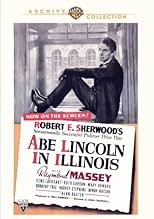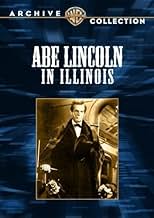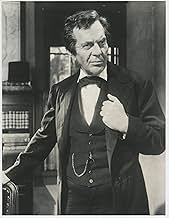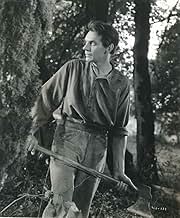VALUTAZIONE IMDb
7,3/10
2108
LA TUA VALUTAZIONE
Aggiungi una trama nella tua linguaHumble Abraham Lincoln gains the respect of his Illinois neighbors, growing in stature and respect until he is elected President in 1860 and departs for Washington.Humble Abraham Lincoln gains the respect of his Illinois neighbors, growing in stature and respect until he is elected President in 1860 and departs for Washington.Humble Abraham Lincoln gains the respect of his Illinois neighbors, growing in stature and respect until he is elected President in 1860 and departs for Washington.
- Candidato a 2 Oscar
- 2 candidature totali
Howard Da Silva
- Jack Armstrong
- (as Howard da Silva)
Trama
Lo sapevi?
- QuizAfter his success playing Lincoln in the film and on Broadway, Raymond Massey began to assume the character in real life. He often appeared at social gatherings dressed in Lincoln-esque attire, assuming a Lincoln-like manner and speech. His friend, the playwright George S. Kaufman, observed, "Massey won't be satisfied until someone assassinates him."
- BlooperWhen results for the 1860 election are being received, West Virginia is listed on the the state-by-state tally board. West Virginia didn't become a state until 1863, when it broke off from Virginia after that state had seceded from the Union.
- Citazioni
Mentor Graham: Well, Abe, there are always two occupations open to those who have failed at everything else: school teaching and politics.
- ConnessioniFeatured in History Brought to Life (1950)
- Colonne sonoreOld Abe Lincoln Came Out of the Wilderness
(uncredited)
Traditional
Sung by chorus over opening credits
Recensione in evidenza
ABE LINCOLN IN ILLINOIS (RKO Radio, 1940), directed by John Cromwell, is not so much a biography of Abraham Lincoln, but the life Lincoln lived from his early years to a position that would lead him to politics, and against all odds, his winning the election for the United States presidency in 1860. Based on the Pulitzer Prize winning 1938 play by Robert E. Sherwood, the screen adaptation, tracing Lincoln's thirty years starting in 1831 to his train ride leading to Washington, D.C., in 1861, stars Raymond Massey in a role he originated on stage, being the best performance of a great American ever enacted by an actor who wasn't. Massey, a Canadian by birth, is not only the perfect candidate for the title role, but an ideal choice. Massey's believability in his role earned him an Academy Award nomination as Best Actor. Although he didn't win the election for that year, it is Massey who very well holds this movie together.
A follow-up of sorts to John Ford's most recent YOUNG MR. LINCOLN (20th Century-Fox, 1939), starring Henry Fonda, focusing on Lincoln's early years as a young lawyer in Springfield, Ill., and a retelling in parts to D.W. Griffith's ABRAHAM LINCOLN (United Artists, 1930), starring Walter Huston, ABE LINCOLN IN ILLINOIS starts off on a rainy afternoon in 1831 with an introduction to the character of Abraham Lincoln (Raymond Massey), age 22, sitting on the floor in a log cabin reading a book by Shakespeare, accompanied by his father (Charles B. Middleton) and a stepmother (Elisabeth Risdon). With the Lincoln family background briefly depicted, the next scene follows Abe, who had left home to accept a $30 a month job as part of the crew rowing a flatboat hauling hogs down the Sangamon River to New Orleans. Along the way he encounters a very beautiful girl named Ann Rutledge (Mary Howard), with whom he decides to settle down in her native town of New Salem where he becomes in charge of a general store, a position offered him by his employer, Denton Offut (Harlan Briggs). When he finds Jack Armstrong (Howard Da Silva), the greatest fighter who cannot be beat, a little drunk and annoying Ann, who, along with his other friends, having invaded her tavern, Abe, a stranger in town, comes to the young lady's defense and publicly wrestles Jack to the end, defeating his advisory and winning the admiration from all, especially the respect and loyal-ship of Jack Armstrong. The year 1832 profiles Lincoln acting as leader in command of his soldiers, with Armstrong being among them, during the Blackhawk War period; 1835 now finds Lincoln in a new position as postmaster general. He is visited by Joshua Speed (Minor Watson) and Ninian Edwards (Harvey Stephens) who introduce Abe to politics by choosing him to serve in the legislature, which he would serve four terms. As for Ann, having been engaged to John McNeil (Maurice Murphy), now living in New York for two years, finds that after receiving a letter from him that he has no intentions of returning to her. To stop gossip from circulating around Ann's good name, Abe admits his love for her from the moment he first saw her, and asks her to become his steady. The relationship between them is cut short when she is stricken with an illness and dies. Lincoln quits the legislation to work in the law office with John Stuart in Springfield, forming a partnership of Stuart & Lincoln, Counselors-at-Law. Slowly improving his social position, Lincoln is introduced to Mary Todd (Ruth Gordon) at a function given by her sister and Ninian's wife, Elizabeth Edwards (Dorothy Tree). Elizabeth wants Mary to marry an aristocrat, someone like Stephen A. Douglas (Gene Lockhart), but her interest rests on Mr. Lincoln, whom she eventually marries on November 4, 1842. The marriage produces four sons (the movie indicates three, eliminating one who died in his fourth year), and shows Mary's fight in having her hayseed husband fulfill his destiny, to become president of the United States.
Ruth Gordon (1896-1985), a prominent stage actress and playwright, in her movie debut, gives a remarkable performance in one of the best carnations of Mary Todd Lincoln ever portrayed on screen. Gene Lockhart (1892-1957), a veteran character actor in many feature film roles, goes unnoticed as a very satisfying Stephen A. Douglas (1813-1861). Lockhart's best moment finds his Stephen Douglas sincerely congratulating his opponent Abraham Lincoln in winning the U.S. election, something that should become a prime example with modern-day candidates.
As mentioned before, ABE LINCOLN IN ILLINOIS is very much a retread to D.W. Griffith's 1930 presentation of ABRAHAM LINCOLN, with differences being the elimination of Lincoln's birth, his trying years in the White House during the Civil War and assassination in April 1865. In many ways, ABE LINCOLN IN ILLINOIS is an excellent movie with excellent portrayals. Being a screen adaptation to a stage play, John Cromwell's direction, makes no indication as such. Minus Technicolor, it's full of outdoor scenery and historical detail ranging from costumes to reproductions of small towns. Highlights include the well staged Lincoln-Douglas debate, and one where Lincoln finally losing his temper towards his wife, Mary, after embarrassing him in front of his committee, by ordering her, twice, "You're not/never to do that again!"
ABE LINCOLN IN ILLINOIS, formerly shown on commercial television annually either on or around Lincoln's birthday, February 12, later presented on video cassette finally on cable television's American Movie Classics prior to 2000, and Turner Classic Movies. Quite enjoyable as a motion picture, and quite informative on a historical point of view, this production, at 110 minutes, succeeds on both counts. "Glory, Glory Hallelujah, his truth is marching on." (****)
A follow-up of sorts to John Ford's most recent YOUNG MR. LINCOLN (20th Century-Fox, 1939), starring Henry Fonda, focusing on Lincoln's early years as a young lawyer in Springfield, Ill., and a retelling in parts to D.W. Griffith's ABRAHAM LINCOLN (United Artists, 1930), starring Walter Huston, ABE LINCOLN IN ILLINOIS starts off on a rainy afternoon in 1831 with an introduction to the character of Abraham Lincoln (Raymond Massey), age 22, sitting on the floor in a log cabin reading a book by Shakespeare, accompanied by his father (Charles B. Middleton) and a stepmother (Elisabeth Risdon). With the Lincoln family background briefly depicted, the next scene follows Abe, who had left home to accept a $30 a month job as part of the crew rowing a flatboat hauling hogs down the Sangamon River to New Orleans. Along the way he encounters a very beautiful girl named Ann Rutledge (Mary Howard), with whom he decides to settle down in her native town of New Salem where he becomes in charge of a general store, a position offered him by his employer, Denton Offut (Harlan Briggs). When he finds Jack Armstrong (Howard Da Silva), the greatest fighter who cannot be beat, a little drunk and annoying Ann, who, along with his other friends, having invaded her tavern, Abe, a stranger in town, comes to the young lady's defense and publicly wrestles Jack to the end, defeating his advisory and winning the admiration from all, especially the respect and loyal-ship of Jack Armstrong. The year 1832 profiles Lincoln acting as leader in command of his soldiers, with Armstrong being among them, during the Blackhawk War period; 1835 now finds Lincoln in a new position as postmaster general. He is visited by Joshua Speed (Minor Watson) and Ninian Edwards (Harvey Stephens) who introduce Abe to politics by choosing him to serve in the legislature, which he would serve four terms. As for Ann, having been engaged to John McNeil (Maurice Murphy), now living in New York for two years, finds that after receiving a letter from him that he has no intentions of returning to her. To stop gossip from circulating around Ann's good name, Abe admits his love for her from the moment he first saw her, and asks her to become his steady. The relationship between them is cut short when she is stricken with an illness and dies. Lincoln quits the legislation to work in the law office with John Stuart in Springfield, forming a partnership of Stuart & Lincoln, Counselors-at-Law. Slowly improving his social position, Lincoln is introduced to Mary Todd (Ruth Gordon) at a function given by her sister and Ninian's wife, Elizabeth Edwards (Dorothy Tree). Elizabeth wants Mary to marry an aristocrat, someone like Stephen A. Douglas (Gene Lockhart), but her interest rests on Mr. Lincoln, whom she eventually marries on November 4, 1842. The marriage produces four sons (the movie indicates three, eliminating one who died in his fourth year), and shows Mary's fight in having her hayseed husband fulfill his destiny, to become president of the United States.
Ruth Gordon (1896-1985), a prominent stage actress and playwright, in her movie debut, gives a remarkable performance in one of the best carnations of Mary Todd Lincoln ever portrayed on screen. Gene Lockhart (1892-1957), a veteran character actor in many feature film roles, goes unnoticed as a very satisfying Stephen A. Douglas (1813-1861). Lockhart's best moment finds his Stephen Douglas sincerely congratulating his opponent Abraham Lincoln in winning the U.S. election, something that should become a prime example with modern-day candidates.
As mentioned before, ABE LINCOLN IN ILLINOIS is very much a retread to D.W. Griffith's 1930 presentation of ABRAHAM LINCOLN, with differences being the elimination of Lincoln's birth, his trying years in the White House during the Civil War and assassination in April 1865. In many ways, ABE LINCOLN IN ILLINOIS is an excellent movie with excellent portrayals. Being a screen adaptation to a stage play, John Cromwell's direction, makes no indication as such. Minus Technicolor, it's full of outdoor scenery and historical detail ranging from costumes to reproductions of small towns. Highlights include the well staged Lincoln-Douglas debate, and one where Lincoln finally losing his temper towards his wife, Mary, after embarrassing him in front of his committee, by ordering her, twice, "You're not/never to do that again!"
ABE LINCOLN IN ILLINOIS, formerly shown on commercial television annually either on or around Lincoln's birthday, February 12, later presented on video cassette finally on cable television's American Movie Classics prior to 2000, and Turner Classic Movies. Quite enjoyable as a motion picture, and quite informative on a historical point of view, this production, at 110 minutes, succeeds on both counts. "Glory, Glory Hallelujah, his truth is marching on." (****)
I più visti
Accedi per valutare e creare un elenco di titoli salvati per ottenere consigli personalizzati
- How long is Abe Lincoln in Illinois?Powered by Alexa
Dettagli
Botteghino
- Lordo Stati Uniti e Canada
- 1.451.880 USD
- Tempo di esecuzione1 ora 50 minuti
- Colore
- Proporzioni
- 1.37 : 1
Contribuisci a questa pagina
Suggerisci una modifica o aggiungi i contenuti mancanti

Divario superiore
By what name was Abramo Lincoln (1940) officially released in India in English?
Rispondi




































